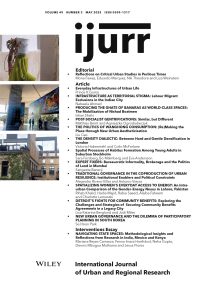The national urban regeneration policy in South Korea, launched in 2013, has been hailed as a milestone in the history of the country’s urban planning as it has introduced extensive measures for strengthening citizen participation in the planning process. By drawing on the perspective of post-politics and agonistic planning theorists, this article examines how citizen participation in the new urban governance has been practiced and orchestrated by a diverse array of players, including government officials, intermediary organizations, and civil society actors. The empirical analysis demonstrates that, first, the participatory planning system is controlled by the government and arranged to produce consensus while avoiding any dissensus, and second, intermediate organizations/actors are invited/trained to guide citizens to the government-defined participation practices. Therefore, the current form of participatory governance in South Korea can be seen as a form of post-politics where the political is ruled out and controlled through de-politicization measures. Building on these findings, this article discusses how the current integration of the state and civil society creates the unique dilemma of participation, and how the Korean experience can enrich the global debate on post-politics.
Details
Written by:
Se Hoon Park
Digital Object Identifier (DOI)
https://doi.org/10.1111/1468-2427.13310
About DOI

